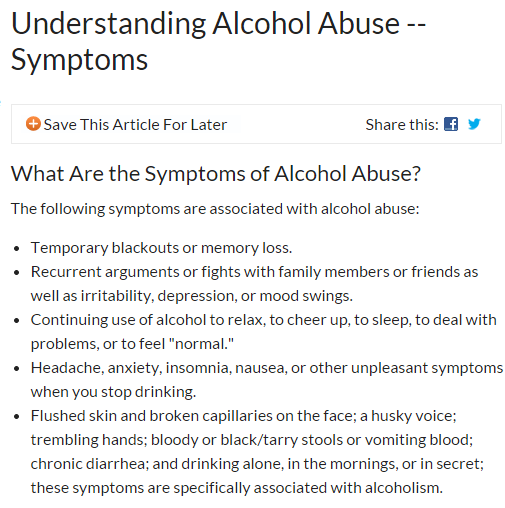Drinking may be an acceptable social activity. If done excessively, however, it can endanger your health and your life. To illustrate, an article on WebMD discusses alcohol abuse and describes its symptoms:
- Temporary blackouts or memory loss.
- Recurrent arguments or fights with family members or friends as well as irritability, depression, or mood swings.
- Continuing use of alcohol to relax, to cheer up, to sleep, to deal with problems, or to feel “normal.”
- Headache, anxiety, insomnia, nausea, or other unpleasant symptoms when you stop drinking.
- Flushed skin and broken capillaries on the face; a husky voice; trembling hands; bloody or black/tarry stools or vomiting blood; chronic diarrhea; and drinking alone, in the mornings, or in secret; these symptoms are specifically associated with alcoholism.
Those are just the physical effects of alcoholism. The social effects of alcoholism can be staggering; it has been noted by the National Institute on Alcohol Abuse and Alcoholism that over 5,000 people under the age of 21 die every year from alcohol-related accidents and homicides.
If you’ve fallen into the habit of turning to the bottle to relieve the stresses of daily life, it may be time to think of checking into a St. Louis, MO alcohol rehab facility like Midwest Institute for Addiction. The problem is recognizing that you have a problem. Ask yourself whether you had ended up drinking more than you should or have started to excessively crave drink in the recent past. If you have, these can be warning signs of alcoholism.
Once you’ve checked into alcohol rehab in St. Louis, your journey towards betterment should begin. The first step is usually to start with an alcohol detox period that lasts for 5-7 days. This cleanses the body of any liquor in its system. Withdrawal symptoms like chills and irritability can be uncomfortable but are necessary parts of treatment.
Counseling will start after your system is clean. This will give you the skills necessary to maintain your sobriety and to stop you from backsliding, like self-control and self-awareness. Individual and group counseling sessions can be part of this rehabilitation scheme. What you learn here will continue to be applied after you leave the facility, helping you to maintain your chance at a better life.
(Source: Understanding Alcohol Abuse – Symptoms, WebMD)











